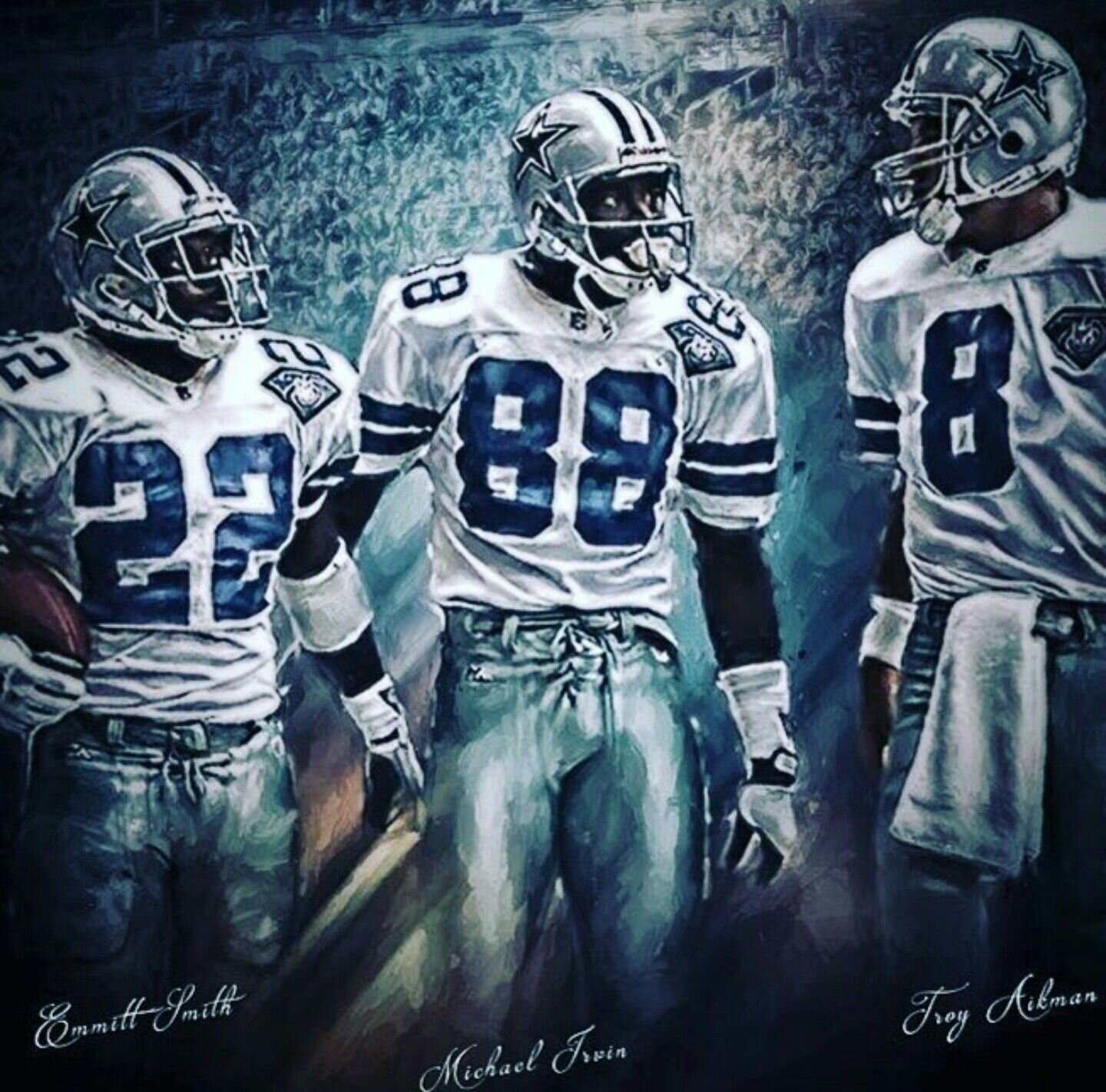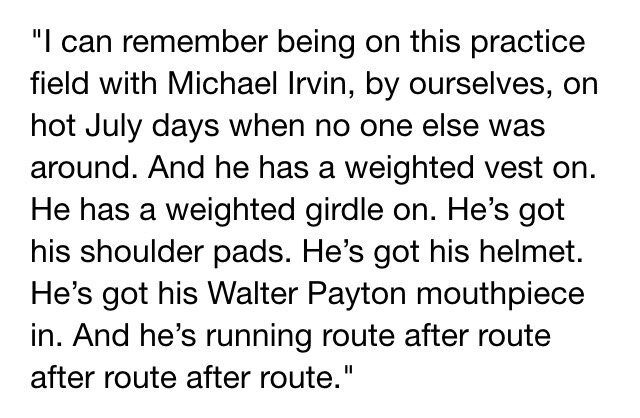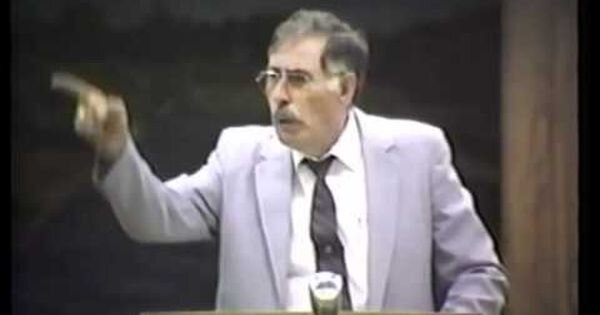It ain’t easy (to make it look easy)
Greatness is in the grind!
If you remember NFL football in the 90s, you remember the three-time Super Bowl Champion Dallas Cowboys. They were the first team to win three Super Bowls in four years. They did it with worker bees on defense and megastars on offense.
The so-called triplets – Troy Aikman, Emmitt Smith, and Michael Irvin – are all now in the Hall of Fame. So is their coach, the irrepressible Jimmy Johnson.
Troy was precision personified, a steady leader under fire. Emmitt was driven by an inner strength and desire to achieve like few in sports history have been. He was not the biggest, the strongest, or the fastest running back in history – or even in his era – but he was the most determined, the most consistent, the most driven, and the most durable. Consequently, he retired with the most rushing yards in league history.
Then, there was the flash-and-dash of Michael Irvin. Irvin rubbed opponents and detractors the wrong way. He was edgy and raw. He was in-your-face. He was animated. He didn’t mind celebrating a first down catch and sure didn’t mind celebrating touchdowns. Unlike Troy and Emmitt, who may have been sainted, Michael was edgy off the field, too. He got into trouble with cocaine and girls and nearly ruined his career…and his life.
But he was great on the field, wasn’t he? No one outfought defensive backs for jump balls better than Michael. No one ran crossing routes with abandon more than Michael.
What the public saw was this incredibly flawed, boisterous, flamboyant athlete. But Jason Garrett, the man who was Troy Aikman’s backup quarterback and would go on to coach the Cowboys for a decade remembers the other side of Michael. He knows what made Michael great. He shared it in a 2016 tweet:
You thought he was all mouth? You thought he was just a flashy player with a massive ego? None of his teammates looked at him like that. No one was more vocal about Michael Irvin as a great teammate than Troy Aikman. In 1996, when Irvin went on trial for cocaine possession, Troy Aikman created no small stir when he showed up at court in support of his friend. Troy always said that no one worked harder than Irvin and that Irvin was the heart and soul of the 90s Cowboys.
Aikman knew what Garrett saw: Irvin’s greatness was in the grind. He was not a speedster. He seldom ran away from anyone. But he worked on his game relentlessly. If the ball was in the air and coming his way, he was going to do everything in his power to ensure he caught it. Then, he was going to fight like Hell for as many yards as he could get.
I was 11 or maybe 12 years old and already obsessed with great preaching and preachers when I heard this fire-breathing evangelist named Ed Ballew preach a sermon he titled Rotten Bridges Over Hell. I remember the title, the preacher, and the sermon because it was poignant, poetic, and powerful. I carried the imagery his words painted on the canvas of my fertile pubescent mind for weeks, months, and years.
Even now, decades later, the memory remains.
Fast-forward and I am 18 years old, a fledgling preacher and first-year seminary student. The president of the seminary I am attending is a family friend and mentor, a seminal influence in my life. He stops me after class one day to tell me he has volunteered me to guide the youth ministry for a week-long revival meeting to be held at the Calvary Baptist Church in Perry, Oklahoma, where an interesting character by the name of W. W. Baker is pastor.
As an aside, Baker is a friend and prot©g© of J. Frank Norris, the notorious leader of the Independent Baptist movement. A graduate of Baylor University (and his class’s valedictorian), Norris led a group of ministers and their churches out of the Southern Baptist Convention, accusing the Convention of liberalism and of accommodating such anti-Christian notions as Evolution.
Norris was a rough-and-tumble preacher, whose magnetism and intelligence were only matched by his indomitable will and willingness to go to great lengths to achieve and ensure his desired end. Norris once shot and killed a man who was allegedly out to kill him. He was acquitted of murder in a sensational trial.
W. W. Baker was an older preacher when I met him, maybe in his sixties or even seventies. Norris was long-since dead and gone, but Baker had his own stories, one of which included some Fort Worth businessmen who profited on the sell of alcohol and took exception to his incessant preaching against its evils. Those men had him pistol-whipped on the streets of Fort Worth. He was told he would get much worse if he did not cease his attack on the sell of alcohol in the city.
The next Sunday, Baker approached the pulpit, still bearing the marks from his beating, pulled a Colt .45 from his waistband, laid it on the pulpit, and proceeded to preach on the evils of alcohol, naming his assailants and their bosses by name.
Baker founded the First Baptist Church of Haltom City, Texas, a Fort Worth suburb, in 1951. Sometime in the mid-60s, he found his way to the Perry, Oklahoma church, the one to which I was sent to rally the youth during a revival meeting.
There you have a little history on how W. W. Baker and I came to intersect paths.
Back to Ed Ballew.
Ballew was the evangelist holding the week-long revival meeting at Baker’s church. I had neither seen nor heard the man preach since I was 11 or 12. If I had worried that he would not live up to my expectations or possibly-exaggerated memory, such worries were assuaged on the very night of the revival, when Ballew ascended the stage of that smallish church and promptly swept the people packing the sanctuary away to Mount Sinai, where Abraham is set to offer his son Isaac on the altar as proof of his loyalty to Yahweh, only to be stopped by the hand of God Himself.
My memories were not, in fact, the least exaggerated. There was a homespun eloquence and unmistakable power in the man. By sermon’s end, the listeners swarmed the altars of that church, tearfully confessing themselves sinners in need of grace. Night after night, a similar scene was repeated.
Now, let me hasten to take you to Wednesday night of revival week. We are halfway done with the meeting. The evening crowd has long dispersed, exhausted and exhilarated by yet another night of spitfire sermonizing and Holy Ghost movement. Mrs. Baker has fed her husband, Ballew, and me a hearty meal and delicious dessert and now, over coffee, I listen to stories the men tell from the long and winding trails of their respective ministries, including Baker’s tale of the pistol-whippers, which he would not have told had Ballew not insisted. W. W. Baker was a humble and understated man, though gritty and tough as nails.
I don’t even like coffee (well, I have since changed THAT tune), but I am doctoring it with sugar and consuming it like a cowboy at an evening fire on a trail drive, just to be there for the storytelling.
Fast-forward a couple of hours. Ballew and I have retired to the little wood-framed house that was once the parsonage but is now the prophet’s chamber, the place the church maintains for guest ministers. I am in bed and nearly asleep when I hear the muffled sounds of Ballew’s voice in the other bedroom across the hall. Curious, I slip from my bed and into the hall to listen. What I hear is a full-on sermon, being preached as if there were an actual congregation present to hear it, with the same cadence, voice inflection, and emotion. I stand there for a long while, listening to this man of God perfect his next sermon there in the deep of the night.
When he is done preaching to no one, I hear him shuffle about and I imagine he is kneeling beside his bed. Now he is praying, fervently for the sinners in that town, some of the people he has met, whom he calls by name, for Pastor Baker and his wife and for me.
I slip back into my room, ease my door closed, and return to bed, a little overwhelmed, and acutely aware that greatness is not an accident or a fluke, nor is it a birthright.
Michael Irvin and Ed Ballew are polar opposites. I am pretty sure this is the first time in human history their names and stories have been intertwined. Each, however, in his own way serves to illustrate that greatness, true greatness, Hall of Fame greatness, Heaven-pleasing, Hell-shaking greatness is in the grind.



